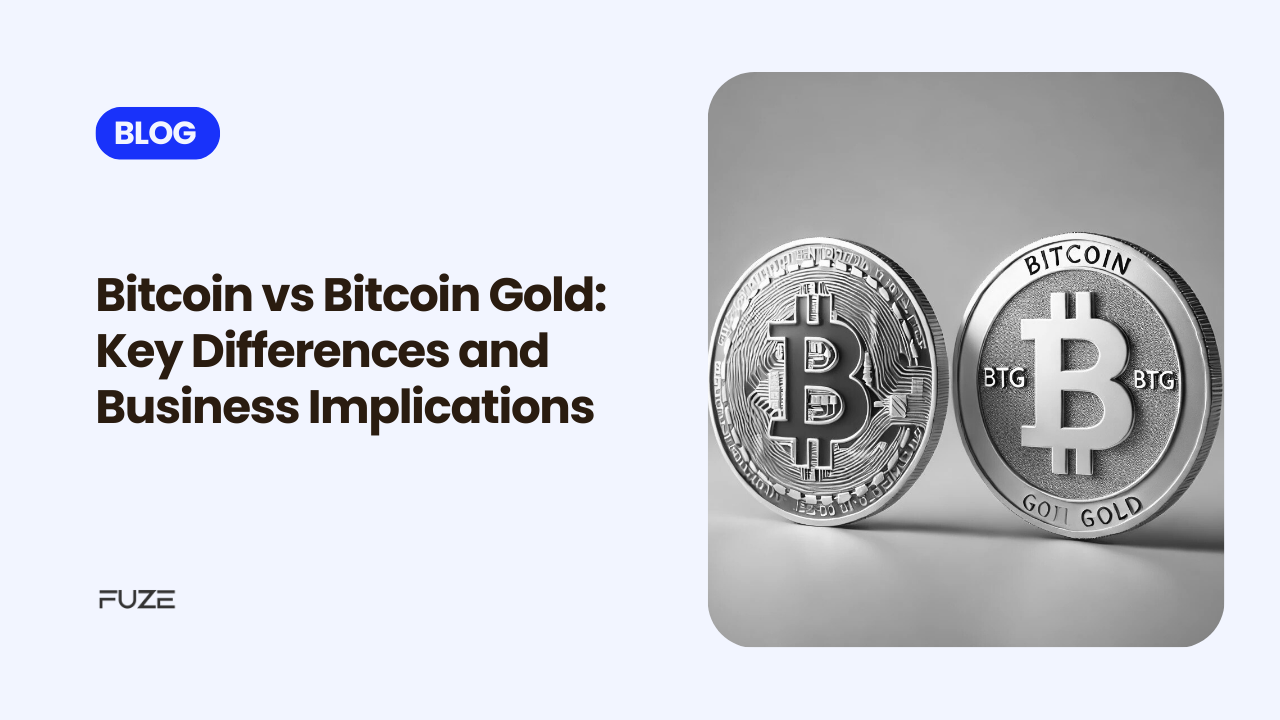Bitcoin (BTC) has long been the pioneer of the cryptocurrency world, serving as a digital store of value and paving the way for a decentralized financial ecosystem. Over time, however, the limitations of Bitcoin’s Proof of Work (PoW) consensus mechanism and the concentration of mining power have spurred the creation of alternatives, including Bitcoin Gold (BTG). Bitcoin Gold aims to address some of Bitcoin’s challenges by offering a decentralized, GPU-friendly mining approach, making it more accessible to a broader range of participants.
This article explores the major distinctions between Bitcoin and Bitcoin Gold, their strengths and weaknesses, and which use cases they serve best, helping you make an informed decision about which might be the right fit for your portfolio.
The Origins of Bitcoin and Bitcoin Gold
Bitcoin (BTC)
Bitcoin was launched in 2009 by an anonymous entity known as Satoshi Nakamoto, designed as a decentralized digital currency that enables peer-to-peer transactions without intermediaries like banks. As the first cryptocurrency, Bitcoin has established itself as “digital gold,” a secure and valuable store of wealth.
Bitcoin Gold (BTG)
Bitcoin Gold emerged in 2017 as a fork of Bitcoin, created to combat the centralization of Bitcoin mining. The developers of Bitcoin Gold introduced a different mining algorithm, Equihash, to make mining accessible to people with standard GPU hardware rather than expensive and specialized ASICs (Application-Specific Integrated Circuits) used in Bitcoin mining. By doing so, Bitcoin Gold aimed to “decentralize” mining and provide an opportunity for more people to participate in the network’s security.
Key Differences Between Bitcoin and Bitcoin Gold
To better understand these two cryptocurrencies, let’s examine their core differences:
1. Mining Algorithms: SHA-256 vs. Equihash
- Bitcoin (BTC): Utilizes the SHA-256 algorithm, which requires specialized and costly ASIC hardware to mine. This has led to the centralization of Bitcoin mining, as only those with significant capital can afford to compete in the mining industry.
- Bitcoin Gold (BTG): Bitcoin Gold’s developers chose the Equihash algorithm, which is ASIC-resistant. This means that anyone with a GPU can mine BTG, promoting a more decentralized mining ecosystem.
2. Decentralization of Mining
- Bitcoin: The high barrier to entry for Bitcoin mining has led to centralization, with a few large mining pools controlling much of the network’s hash power. This centralization has raised concerns over potential security risks and the loss of Bitcoin’s original vision of decentralization.
- Bitcoin Gold: By enabling GPU mining, Bitcoin Gold is more accessible and therefore encourages greater decentralization. This approach aligns with the ethos of a “people’s coin,” as mining BTG doesn’t require costly, specialized hardware.
3. Purpose and Use Case
- Bitcoin: Often referred to as “digital gold,” Bitcoin’s primary use case is as a store of value. While it is also used as a medium of exchange, its slow transaction speeds and high fees make it less practical for everyday transactions.
- Bitcoin Gold: Bitcoin Gold was created as a fairer, decentralized alternative to Bitcoin. Its use cases extend to payments and decentralized applications (DApps) due to its accessibility in mining, though it doesn’t have the same level of adoption or value as Bitcoin.
4. Market Value and Adoption
- Bitcoin: As the world’s first and most well-known cryptocurrency, Bitcoin has a significant lead in market value, adoption, and liquidity. Its widespread recognition and secure network make it attractive to institutional investors and high-net-worth individuals.
- Bitcoin Gold: While Bitcoin Gold has a smaller market cap and fewer use cases than Bitcoin, its accessibility and decentralized mining approach make it a preferred option for miners and smaller investors who support a more democratic network structure.
5. Security and Vulnerability
- Bitcoin: Bitcoin’s SHA-256 algorithm and large network make it highly secure against 51% attacks, which require majority control over the network’s hash power. However, its centralized mining pools can still present vulnerabilities.
- Bitcoin Gold: Bitcoin Gold has faced challenges with security in the past, including a 51% attack. While its smaller network may make it more vulnerable to attacks, improvements in its protocols aim to strengthen security over time.
Advantages of Bitcoin (BTC)
- Widely Recognized Store of Value: With a proven track record and global recognition, Bitcoin serves as a reliable hedge against inflation, much like gold.
- Network Security: Bitcoin’s large network and SHA-256 algorithm provide strong protection against attacks.
- Liquidity: Bitcoin’s high liquidity makes it ideal for both large and small transactions, and it is widely accepted on exchanges and for peer-to-peer transactions.
Advantages of Bitcoin Gold (BTG)
- Decentralized Mining: Bitcoin Gold’s Equihash algorithm promotes fair mining practices by allowing anyone with a GPU to participate.
- Greater Accessibility: BTG is more accessible to average users, making it a popular choice among those who wish to support decentralized networks.
- Community-Driven Development: Bitcoin Gold’s development is community-focused, aimed at promoting fair access and decentralization within the crypto ecosystem.
Which Should You Choose: Bitcoin or Bitcoin Gold?
When deciding between Bitcoin and Bitcoin Gold, consider the following factors:
- Investment Goals: If your primary goal is long-term wealth storage, Bitcoin is the stronger choice due to its established reputation, security, and liquidity.
- Mining Accessibility: If you’re interested in mining but don’t want to invest in costly ASICs, Bitcoin Gold is a better option. Its GPU-friendly algorithm allows greater participation in mining.
- Use Case: Bitcoin is ideal for large transactions and as a store of value. Bitcoin Gold, while not as widely adopted, offers a more accessible platform for those looking to engage in the network and support a decentralized alternative.
Fuze’s Role in Supporting Crypto Diversity
At Fuze, we recognize that the cryptocurrency landscape is vast, with each blockchain network serving unique roles and use cases. Through our Digital Assets as a Service platform, Fuze enables institutions, fintechs, and high-net-worth individuals to seamlessly engage with various crypto assets, whether for trading, payments, or investment purposes. By supporting diverse assets, including both Bitcoin and Bitcoin Gold, Fuze offers the flexibility for users to choose the cryptocurrency that best aligns with their objectives and preferences.
Conclusion
Bitcoin and Bitcoin Gold both provide valuable options within the cryptocurrency ecosystem. While Bitcoin is widely recognized as a digital store of value with immense market traction, Bitcoin Gold offers a more decentralized, accessible mining solution that aligns with the ethos of democratizing digital assets. Each has distinct strengths and use cases, from Bitcoin’s robust security and liquidity to Bitcoin Gold’s GPU-friendly mining and commitment to decentralization.
Ultimately, whether you lean towards Bitcoin for its status as digital gold or Bitcoin Gold for its open mining structure, both play crucial roles in expanding the possibilities of digital finance. At Fuze, we continue to support and facilitate engagement with both traditional and emerging digital assets, helping you leverage the opportunities presented by each unique blockchain solution.
Disclaimer: Virtual assets carry significant risks, including high volatility and potential loss of your entire investment. They are not backed by governmental protections, and recourse may be limited in case of loss. Always assess your risk tolerance, fully understand the risks, and seek independent financial advice if needed before investing.
FAQs
1. What are the main differences between Bitcoin and Bitcoin Gold?
Bitcoin uses SHA-256 for mining, which requires specialized hardware, while Bitcoin Gold’s Equihash algorithm is GPU-friendly. Bitcoin is mainly viewed as a store of value, whereas Bitcoin Gold focuses on decentralization.
2. Can I use Bitcoin Gold as a store of value like Bitcoin?
While Bitcoin Gold can be used as a store of value, it doesn’t have the same level of adoption or security as Bitcoin, which is why many view Bitcoin as the superior option for wealth storage.
3. Which cryptocurrency is easier to mine: Bitcoin or Bitcoin Gold?
Bitcoin Gold is easier to mine due to its GPU-friendly Equihash algorithm, allowing more people to participate without needing specialized ASIC hardware.
4. Are Bitcoin and Bitcoin Gold accepted on the same exchanges?
Bitcoin is widely accepted on almost every exchange, while Bitcoin Gold is available on many, but not as widely accepted as Bitcoin.
5. Is Bitcoin Gold a safer investment than Bitcoin?
While Bitcoin Gold has its own security measures, Bitcoin’s larger network and robust algorithm make it less vulnerable to attacks, making it the safer choice of the two.







